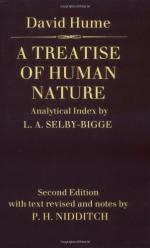
|
| Name: _________________________ | Period: ___________________ |
This test consists of 5 multiple choice questions, 5 short answer questions, and 10 short essay questions.
Multiple Choice Questions
1. What direct passions do natural instincts produce?
(a) Love and hate.
(b) Fear and hate.
(c) Pleasure and pain.
(d) Desire and joy.
2. Which of the following is a group of contrary?
(a) Benevolence and anger.
(b) Love and hate.
(c) Respect and contempt.
(d) Pity and malice.
3. What is the title of Book Two, Part Three?
(a) Of Justice and Morality.
(b) Of Love and Hate.
(c) Of Free Will and Indirect Passion.
(d) Of the Will and Direct Passions.
4. What was required to regulate society once it had evolved into a certain order?
(a) Passion.
(b) Religion.
(c) Morality.
(d) Justice.
5. What does Hume say we need to stop men from fighting?
(a) Sport.
(b) Women.
(c) Social units.
(d) Children.
Short Answer Questions
1. What passion does Hume say malice is like?
2. Of what does virtue give us the impression?
3. By what does Hume say all human action is determined?
4. From where does Hume say we derive our feelings of love and hate?
5. Who does Hume say must be bound to family in order for it to work?
Short Essay Questions
1. When do moral pleasures and pains occur?
2. What does Hume mean when he says one cannot derive an ought from an is?
3. What is Hume's argument against those who defend free will?
4. Why does Hume claim women need a sentiment of chastity?
5. Why does Hume say common loyalty is so important?
6. How does Hume use murder as an example of morals?
7. How does love and hatred differ from pride and humility?
8. How does Hume define natural virtues?
9. How does Hume define will?
10. How does Hume define artificial virtues?
|
This section contains 630 words (approx. 3 pages at 300 words per page) |

|




